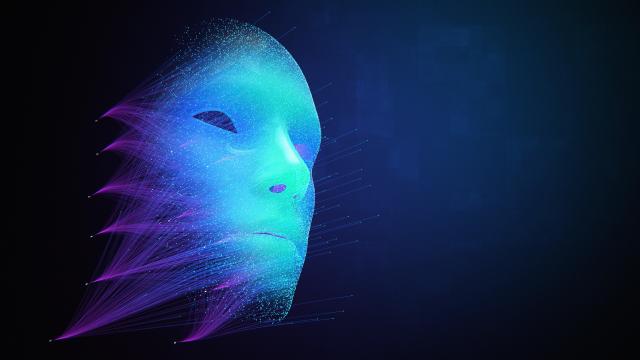Sure, there’s been a lot of attention being paid to deep fakes of celebrities and major public figures. Still, with the advent of free or cheap AI-based voice synthesization software, anybody who has had their audio uploaded to the internet runs the risk of being deepfaked.
Vice first reported that voice actors and other, ordinary folks are being targeted with online harassment and doxxing attacks using their own voice. Specifically, these attacks targeted people with YouTube channels, podcasts, or streams. Several of these doxxing attempts also hit voice actors, some of whom have been especially critical about AI-generated content in the past.
Voice actors Zane Schacht and Tom Schalk were among several who were targeted by videos on Twitter containing faked audio that shared their home address while using racist slurs. Schacht, who has done voice work for properties like Fallout 4, told Gizmodo he and other voice actors were targeted after posting their outspoken antipathy toward generative AI. Schalk, who has done voices in several indie video games and animated series, also said the folks targeted by the malicious tweets had been outspoken on AI.
Some of these accounts and offending tweets have been banned and deleted from Twitter, though a few of those malicious tweets remained online for some time. Gizmodo was unable to independently verify whether the offending tweets or accounts remain online.
A few of the reported posts explicitly said they were generated using tech available from ElevenLabs. The company’s Voice Lab software lets users clone voices and then generate new audio based on a text prompt. Of course, this free program let users produce deep faked audio of prominent people like Joe Rogan and Justin Roiland saying sexist or racist epithets. After users reported examples of those deep fakes to the company, ElevenLabs announced they were making VoiceLab only available to users of the paid version and was introducing more identity verification for new accounts.
Schacht told Gizmodo in an email that he fears there could be major issues with misinformation once this tech becomes even more prolific.
“But even outside of legal hypotheticals, the very act of using a computer program to take, manipulate, and use someone’s voice feels truly heinous to me,” the voice actor wrote. “It feels like something out of a nightmarish fairy tale.” “The human voice is a beautiful thing.” he went on to say.
In an email statement, a ElevenLabs spokesperson told Gizmodo “We are aware of cases of text to audio software being used to create offensive or objectionable content which have then been falsely attributed to our technology. We are able to identify all content made using our software and, on investigation, all but one of the clips flagged were created using other platforms.”
Vice showed that a few of the victims for the tweets received a Twitter DM from ElevenLabs apologizing for the harassment, further saying “we have the IP address of that person,” referring to the harasser’s account.
The spokesperson further reiterated ElevenLabs’ new safeguards against malicious users and its “zero tolerance approach” to the misuse of “any text to audio software to harm or harass others.” They added: “we have confidence that existing and upcoming safeguards will continue to tackle this and allow the vast majority of people to continue using text to audio tools for good.”
Voice Actors Like Mike Pollock Say AI-Generated Copies Are an Ongoing Problem
Of course, there are other companies that also allow users to create AI generated voices. Sites like UberDuck, FakeYou and Storyteller can create fake voices based on audio clips. Voice actors told us that they have had to play a never ending game of wack-a-mole to deal with fake versions of their character voices being used on social media.
When your distinctive voice is an aspect of your livelihood, voice actors are faced with the daunting task of getting social media to remove deep fake versions of their own voice. Mike Pollock, a voice over actor most known for providing the megalomaniacal intonations of Doctor Eggman for the Sonic the Hedgehog franchise, wrote that there are multiple examples of deep fakes using his voice being uploaded to YouTube.
Hey @TeamYouTube, what’s the best recourse for us actors who find unauthorized AI deepfake versions of our voices used on YouTube and would like to get those videos removed?
Do we just ask the uploader politely and hope for the best? Or is there a stronger option?
Thanks.
— Mike Pollock (@itsamike) February 11, 2023
In a phone interview, Pollock told Gizmodo he’s been dealing with people uploading AI-generated versions of his characters, like Doctor Eggman, for over a year. He’s contacted UberDuck and FakeYou to have the companies remove his voice from their systems, but he still regularly comments on YouTube videos replicating his voice, asking them to remove the videos.
Recently, he’s joined with several other voice actors on Vocal Variants, a trade group representing voice actors and other performers trying to push back against AI-generated voices and promote work contracts that still allow actors the right to their voice. He said the next best thing for voice actors would be a law that codifies their right to their vocal likenesses.
“I’m doing the best I can,” he said. “I’m content in the knowledge that if a client hears me saying something horrible, I can say it’s not me. Still, I don’t have much good to say about people who think it’s fun to ruin somebody’s livelihood.”
